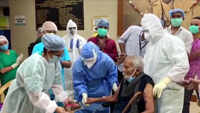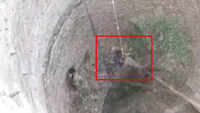
Noida: The genetic roots of the Covid-19 virus found in patients admitted at the Government Institute of Medical Sciences (GIMS) is similar to those in the US and Europe, and not China, an ongoing study of genome sequences by Covid hospital and research facility has found so far.
This study is aimed at finding the origins of the virus that infected people in the country. “In all the patients here, the genetic trace of the virus is very similar to that in the US and Europe. Our deduction is that the virus first travelled to these countries from China and then came to India,” said Dr Vivek Gupta, in-charge of molecular diagnostics and research laboratory at GlMS. The study was conducted on 75 patients.
The research team also found different levels of mutation of the virus after a certain period. “After 14 days, if the virus remains in the body of the host, it tends to mutate. Some novel mutations in the viral genome were noticed during the study. We are yet to analyse them,” Dr Gupta said.
Funded by Council of Scientific and Industrial Research-IGIB, the study is being conducted across 10 centres — AIIMS Delhi and Jodhpur, Maulana Azad Medical College, Delhi; GIMS; National Centre for Disease Control (NCDC), Delhi; Ram Manohar Lohia Hospital, Delhi; JIPMER, Puducherry; Tirunelveli Medical College; Government Medical College, Kozhikode; and Malabar Cancer Centre, Thalassery.
Other researches that GIMS is conducting include metabolomics — which involves examining clinical features of metabolites released in Covid patients and the way they affect other organs — and proteomics, a study of protein antibody. These studies began in April and are likely to take almost a year to complete.
The institute is also exploring the possibility of using sputum (as in TB cases) as an alternative to nasal and throat swab samples for Covid tests.
Metabolomics: This research is being conducted by GIMS itself and studies the effect of the virus on a patient’s metabolism or other organs like the kidney and liver. “Samples have been collected from 65 patients. The results are yet to come,” said Dr Gupta.
Proteomics: This involves a study of antibodies in a patient. “When a Covid patient is admitted here, we take the blood samples at three points — on the third, sixth and the day of discharge — to study the antibodies being generated. This study will help us analyse the immune factors that are involved,” the doctor said. He added that the findings of these studies would eventually help scientists who are preparing a vaccine for Covid-19.
Sputum testing: Dr Gupta said a study was yet to be conducted on the efficacy of such a test. “There are papers in medical literature which suggest that sputum sensitivity is better than oropharyngeal (part of the throat at the back of the mouth behind the oral cavity) and nasopharyngeal (upper part of the throat that lies behind the nose) tract testing. So, it can definitely be an alternative to nasal or throat swabs. We are planning to explore this, but have not yet begun a research yet,” Dr Gupta said.
This study is aimed at finding the origins of the virus that infected people in the country. “In all the patients here, the genetic trace of the virus is very similar to that in the US and Europe. Our deduction is that the virus first travelled to these countries from China and then came to India,” said Dr Vivek Gupta, in-charge of molecular diagnostics and research laboratory at GlMS. The study was conducted on 75 patients.
The research team also found different levels of mutation of the virus after a certain period. “After 14 days, if the virus remains in the body of the host, it tends to mutate. Some novel mutations in the viral genome were noticed during the study. We are yet to analyse them,” Dr Gupta said.
Funded by Council of Scientific and Industrial Research-IGIB, the study is being conducted across 10 centres — AIIMS Delhi and Jodhpur, Maulana Azad Medical College, Delhi; GIMS; National Centre for Disease Control (NCDC), Delhi; Ram Manohar Lohia Hospital, Delhi; JIPMER, Puducherry; Tirunelveli Medical College; Government Medical College, Kozhikode; and Malabar Cancer Centre, Thalassery.
Other researches that GIMS is conducting include metabolomics — which involves examining clinical features of metabolites released in Covid patients and the way they affect other organs — and proteomics, a study of protein antibody. These studies began in April and are likely to take almost a year to complete.
The institute is also exploring the possibility of using sputum (as in TB cases) as an alternative to nasal and throat swab samples for Covid tests.
Metabolomics: This research is being conducted by GIMS itself and studies the effect of the virus on a patient’s metabolism or other organs like the kidney and liver. “Samples have been collected from 65 patients. The results are yet to come,” said Dr Gupta.
Proteomics: This involves a study of antibodies in a patient. “When a Covid patient is admitted here, we take the blood samples at three points — on the third, sixth and the day of discharge — to study the antibodies being generated. This study will help us analyse the immune factors that are involved,” the doctor said. He added that the findings of these studies would eventually help scientists who are preparing a vaccine for Covid-19.
Sputum testing: Dr Gupta said a study was yet to be conducted on the efficacy of such a test. “There are papers in medical literature which suggest that sputum sensitivity is better than oropharyngeal (part of the throat at the back of the mouth behind the oral cavity) and nasopharyngeal (upper part of the throat that lies behind the nose) tract testing. So, it can definitely be an alternative to nasal or throat swabs. We are planning to explore this, but have not yet begun a research yet,” Dr Gupta said.

Coronavirus outbreak
Trending Topics
LATEST VIDEOS
City
 Watch: 101-year-old Mumbai man recovers from Covid-19, hospital staff celebrates his birthday
Watch: 101-year-old Mumbai man recovers from Covid-19, hospital staff celebrates his birthday  On cam: Drunk man falls into 100-feet-deep dilapidated well, rescued in Andhra Pradesh
On cam: Drunk man falls into 100-feet-deep dilapidated well, rescued in Andhra Pradesh  Love for photography: Man builds 3-storey camera-shaped house in Karnataka’s Belagavi
Love for photography: Man builds 3-storey camera-shaped house in Karnataka’s Belagavi  Kochi school teacher uses Augmented Reality Technology for conducting Lower Primary online classes
Kochi school teacher uses Augmented Reality Technology for conducting Lower Primary online classes
More from TOI
Navbharat Times
Featured Today in Travel
Quick Links
Kerala Coronavirus Helpline NumberHaryana Coronavirus Helpline NumberUP Coronavirus Helpline NumberBareilly NewsBhopal NewsCoronavirus in DelhiCoronavirus in HyderabadCoronavirus in IndiaCoronavirus symptomsCoronavirusRajasthan Coronavirus Helpline NumberAditya ThackerayShiv SenaFire in MumbaiAP Coronavirus Helpline NumberArvind KejriwalJammu Kashmir Coronavirus Helpline NumberSrinagar encounter
Get the app



